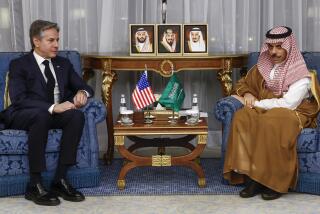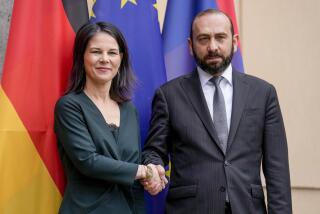Germany, Once a Menace, Sees New Future as a Peace Broker
- Share via
BERLIN — In a quest to supplant its 20th century image as Europe’s greatest menace, Germany is embracing the role of peacemaker and intermediary in some of the world’s most irreconcilable conflicts.
The ambition to broker cease-fires and bolster trust through freer trade has taken German diplomats in recent months to North Korea, Libya and Cuba--all so-called “nations of concern” with which the United States has poor relations and little clout.
Now, in the absence of aggressive intervention from Washington, Berlin is taking on the world’s most volatile crisis, the one in the Middle East. German Foreign Minister Joschka Fischer has appealed to Palestinian and Israeli adversaries to meet in Berlin for talks aimed at finding a peaceful solution to the 11-month-old Palestinian intifada.
Israeli Foreign Minister Shimon Peres and Palestinian Authority President Yasser Arafat had expressed readiness to accept Fischer’s offer last week until violence escalated, disrupting plans for a meeting originally set for Tuesday. No new date has been mentioned, but Fischer called both leaders Tuesday. Israel’s ambassador here, Shimon Stein, said his government was in principle ready to resume talks.
Fischer was in Israel during one of the deadliest incidents in the recent spate of violence. The foreign minister, a former street fighter-turned-pacifist, was in Tel Aviv on June 1 when a Palestinian bomber killed himself and 21 young people at a popular disco. Fischer extended his stay to urge Israeli Prime Minister Ariel Sharon to refrain from immediate retribution. He also persuaded Arafat to call a halt to hostilities and denounce the deadly act.
But Germany’s interventionist tendency has been apparent for more than a year. It is an expansion of the long-standing policy of “critical dialogue” developed under former Chancellor Helmut Kohl to keep the door open to conciliatory “rogue” nations. German ties to Iran are among the closest of any Western country, and the same can be said of its relations with Cuba, North Korea, Libya and Syria.
Economics Minister Werner Mueller traveled to Havana last month to meet with Cuban leader Fidel Castro. Two months earlier, another German Cabinet member, Heidemarie Wieczorek-Zeul, signed a trade and foreign aid deal there. The overture was seen by other European nations as a sign that American allies are tired of playing along with the U.S.-Cuba standoff.
Last year, Chancellor Gerhard Schroeder succeeded where U.S. officials have often stumbled--getting China to put human rights commitments in writing. Berlin’s more understated diplomacy--favoring quiet negotiations over public pressure--let Beijing promise improvements without having to publicly concede past and ongoing abuses.
Germany also established diplomatic relations with outcast North Korea in March and offered its aid and experience with reunification. Berlin’s experience in unifying East and West Germany has given it rare expertise on how to narrow the ideological and economic chasm between North and South Korea.
German diplomats explain their recent peacemaking overtures as subtle, behind-the-scenes efforts at moral compensation.
While the government has paid out billions of dollars in reparations over the nearly six decades since the Holocaust, it has only recently taken steps toward social restitution by throwing open its doors to Jewish immigrants from Eastern Europe. Germany’s Jewish population has swelled from 30,000 five years ago to well over 100,000 today.
That connection has helped lift Berlin into the role of Israel’s closest friend in Europe. Because Germany enjoys better relations with much of the Arab world than does the U.S., the Palestinians also see Berlin as an intermediary in the pursuit of peace.
Fischer’s latest undertaking has been praised by his countrymen and is seen as a sign that his office has recovered from an embarrassing leak involving another high-profile intervention: the March meeting between Libyan leader Moammar Kadafi and Schroeder’s chief foreign policy advisor, Michael Steiner.
A confidential cable detailing a discussion Schroeder had with U.S. officials a few days later suggested that Kadafi had admitted a role in terrorist attacks against Americans and had told Steiner he wanted better relations with the United States. The leak of the memo, which was excerpted in many German newspapers, suggested that Fischer’s ministry had been indiscreet in its effort to ease U.S.-Libyan tensions.
Fischer and Schroeder have won praise from commentators and analysts for their latest endeavors, but they have also received warnings about inflated expectations. Many more seasoned diplomats have tried and failed to crack the Mideast impasse, they observe, arguing that the sudden emergence of Germany as a global mediator is more the result of historical and diplomatic coincidence than insightful design.
More to Read
Sign up for Essential California
The most important California stories and recommendations in your inbox every morning.
You may occasionally receive promotional content from the Los Angeles Times.











